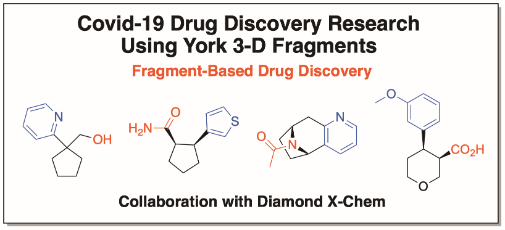Drug Discovery
Identifying small molecules that can inhibit or modulate biological processes is the mainstay of new drug development and has had an enormous beneficial impact in human healthcare. Within YBRI, there are a range of activities from the structure-based design of new bioactive molecules to improving delivery vehicles with the goal of developing the next generation of new drugs and treatments for both genetic and infectious diseases.
Biochemistry
One way of developing new and better drugs is to start with an existing compound that may have poor affinity or undesirable selectivity and use structural information to build off this compound to improve these properties. For example, identifying 3-D fragments as useful starting points for drug discovery against two Covid-19 proteins (O'Brien). The application of structural biology to the development of better drug design is also a major research theme within the York Structural Biology Laboratory (YSBL). Researchers at York also investigate how to synthesise drugs based on the structure and function of biochemical compounds, e.g. proteins, to target cancers such as acute myeloid leukaemia (Grey).

Covid-19 Drug Discovery Research Using York 3-D Fragments
Natural products
Nature provides a rich source of complex molecules that can have medicinal benefits, many of which are produced in very small amounts and are difficult to synthesise de novo. By discovering the biosynthetic genes and pathways of these compounds in plants it can be possible to engineer plants and microbes for higher production (Graham). These natural products have been honed by millions of years of evolution to be bioactive. They account for almost a quarter of all drugs (50% in cancer) in terms of origin or inspiration. Natural compounds can have features or structures that are not easily accessible through typical synthetic chemistry means. As such they cover a distinct search space and represent a green source for novel drugs. Through a collaboration between York Biomedical Research Institute and Centre for Novel Agricultural Products researchers (Lagos, Graham, Czechowski, Lichman, Tonon, Brackenbury, Kourtzelis) have curated the York Natural Product Library as a resource for discovery of novel immunotherapies (Lagos, Kourtzelis), anti-cancer agents (Lagos, Brackenbury) and neurodegeneration therapeutics (Chen).
Infectious disease
Drugs are also used to target infectious disease and York has major research themes in identifying new drugs for tropical parasitic diseases such as leishmaniasis. Research in collaboration with drug companies such as Novartis who have large collections of small molecules shows how new anti-parasitic drugs can be identified and then refined (Mottram). There are many other factors other than just target modulation in the development of new drugs, such as developing new ways of delivering existing drugs, for example topically on the skin rather than orally, can lead to improvement in their efficacy (van Bocxlaer).
Cell Surface Receptors
Finally, not all drugs are small molecules and therapeutic monoclonal antibodies are increasingly being used in the clinic to treat diseases such as cancer, autoimmunity and even infectious diseases. Frequently, these antibodies target accessible proteins on the cell surface; research at York is building a library of human cell surface receptors that can be used to identify new targets for this class of drugs (Wright). Eventually, there are plans to compile a library of over 1500 receptor proteins, representing the vast majority of those in the human genome, formatted and accessible in a way that will allow easy access for other researchers. This research infrastructure is expected to make contributions to our understanding of host-pathogen interactions and identify new immunoregulatory receptors that could be targeted by therapeutic antibodies.
Contact us
York Biomedical Research Institute
ybri@york.ac.uk
B/H/002, Department of Biology, Wentworth Way, University of York, York, YO10 5NG
Twitter
Contact us
York Biomedical Research Institute
ybri@york.ac.uk
B/H/002, Department of Biology, Wentworth Way, University of York, York, YO10 5NG
Twitter